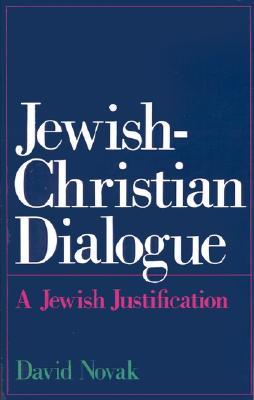David Novak, Professor of Modern Jewish Thought at the University of Virginia, sets out to argue the case for what is called Jewish-Christian “dialogue.” Unfortunately, the author never gives us anything but the most offhand idea of what he means by the term, but we can assume he means the activity carried out largely by professional dialogue bureaucrats at meetings, conferences, and colloquia sponsored by organizations like the National Conference of Christians and Jews and the Com mission for Catholic-Jewish Relations of the National Conference of Catholic Bishops. If with the publication of this book David Novak has emerged as the principal intellectual spokesman for this activity, then the case for it does not promise to be especially strong.
In fact, Novak never really gets around to making that case. He begins by tracing the course of Jewish thought on the legal and theological status of Christianity-the trajectory of which has in his view been in the direction of progressively greater tolerance. Accord ing to Novak, rabbis of the Talmudic period divided roughly between those who saw all gentiles, including Christians, as fundamentally separated from God, and those who believed that, by adhering to a relatively undemanding boiled-down regimen of commandments derived from the Bible, any gentile could achieve a state of righteous ness independent of Judaism. In the medieval period, Maimonides held that technically Christianity constituted a form of idolatry, but that because its adherents continued to uphold the Jewish Scriptures, they might at some future date be led to “return to what is best.” In the 19th and early 20th centuries, leaders of the Reform movement began to talk about a new Jesus, Jesus the teacher as opposed to Jesus the false Messiah, and predicted that this de-Christologized Christ would be the bridge Jews and Christians would use in crossing over to a new era of universal brotherhood. More to Novak’s liking is the theology of Frank Rosenzweig (1886-1929), who accepted Christianity as “the only viable revealed religion for the rest of (non Jewish) humanity.”
This is all relatively straightforward. But as H.L. Mencken liked to say, a professor must have a theory, as a dog must have fleas. Unfortunately, when this professor turns to explain his own theory of Jewish-Christian relatedness, his language becomes so opaque as to be nearly incomprehensible. We get sentences like this: “Thus the scriptural ethic is deontological qua act and teleological qua consequences”—whole passages, even.
As far as I can tell, Novak would have Jews see Judaism and Christianity as equally legitimate faiths—even, paradoxically, as equally true. Mind you he never actually comes out and says this. What he does say is that his “preferred approach in constituting the Jewish-Christian Dialogue . . . is to see the general as the background of possibility, part of which is realized in the singularity of Jewish revelation.” From scattered deciferable passages in his final chapter, one gleans that he has learned from Maimonides that in the Jewish tradition true divine prophecy is given not only to Jews, but to Gentiles as well. For Novak, l gather, the “general” represents something like a field of all possible divinely revealed truths, from which the “singularities ” of Judaism and Christianity rise up like a pair of twin warts.
Though in his introduction Novak describes himself as “a traditionalist Jewish theologian,” his approach to theology strikes one as less than traditional. In sorting out the diversity of Jewish opinion on the status of Christianity, he regularly judges those opinions not on the basis of whether they seem to accord with divinely revealed truth, but on the basis of whether they seem convenient to the cause of dialogue. “Dialogue has definite pre conditions,” he writes. It “must be constituted in such a way that each side can recognize itself in it. . . . Thinkers in each community must re-search [italics his] their own respective traditions to constitute the integrity of the other community and not lose the integrity of their own.” In other words, Novak puts the interests of dialogue ahead of the interests of truth.
Most readers of this book will pick it up expecting, as its title promises, A Jewish Justification for Jewish-Christian Dialogue. Along these lines, Novak has only one of two things to say. He makes the point that it is in the common interest of Jews and Christians to band together against secular ism and the draining of religious influence from public discourse. Fair enough. But “the dialogue’s most cogent raison d’etre,” he says, may be that it helps preserve “the type of democratic society . . . in which both Jews and Christians] can contribute to its moral foundation.” Does Novak mean to imply that abolishing, say, the Commission for Catholic-Jewish Relations of the National Conference of Catholic Bishops would in some way endanger the “moral foundation” of democracy? I wish I knew.
[Jewish-Christian Dialogue: A Jewish Justification, by David Novak (New York: Oxford University Press) 194 pp., $24.95]

Leave a Reply